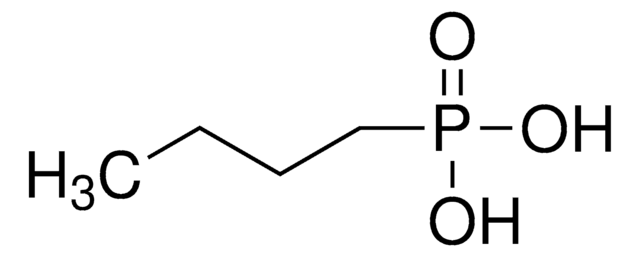68572
Dibutyl phosphate
≥97.0% (T)
Synonym(s):
Phosphoric acid dibutyl ester
Sign Into View Organizational & Contract Pricing
All Photos(1)
About This Item
Linear Formula:
(CH3CH2CH2CH2O)2P(O)OH
CAS Number:
Molecular Weight:
210.21
Beilstein:
607224
EC Number:
MDL number:
UNSPSC Code:
12352100
PubChem Substance ID:
NACRES:
NA.22
Recommended Products
Quality Level
Assay
≥97.0% (T)
form
liquid
density
1.06 g/mL at 20 °C (lit.)
functional group
phosphate
SMILES string
CCCCOP(O)(=O)OCCCC
InChI
1S/C8H19O4P/c1-3-5-7-11-13(9,10)12-8-6-4-2/h3-8H2,1-2H3,(H,9,10)
InChI key
JYFHYPJRHGVZDY-UHFFFAOYSA-N
Looking for similar products? Visit Product Comparison Guide
General description
Dibutyl phosphate, also known as Phosphoric acid dibutyl ester, is an organophosphate compound with a long alkyl chain that is commonly used as an organocatalyst for polymer synthesis via ring-opening polymerization of cyclic esters and to catalyzed transesterification reactions.
Application
Dibutyl phosphate can be used as a reactant to synthesize:
- Glycosyl phosphates by using 1,2-orthoesters.
- 2-Aminophosphatesvia catalyst-free regioselective and enantiospecific SN2-type ring opening reaction with aziridines.
Features and Benefits
- Inherently biodegradable
- Stable in neutral, acidic, or alkaline solutions
Signal Word
Danger
Hazard Statements
Precautionary Statements
Hazard Classifications
Carc. 2 - Eye Dam. 1 - Skin Corr. 1B
Storage Class Code
8A - Combustible corrosive hazardous materials
WGK
WGK 1
Flash Point(F)
352.4 °F - closed cup
Flash Point(C)
178 °C - closed cup
Personal Protective Equipment
dust mask type N95 (US), Eyeshields, Gloves
Choose from one of the most recent versions:
Already Own This Product?
Find documentation for the products that you have recently purchased in the Document Library.
Customers Also Viewed
Y Nishimura et al.
Journal of biochemistry, 118(1), 46-55 (1995-07-01)
Organophosphate compounds are known to cause a selective increase of beta-glucuronidase activity in rat serum. Previous data suggested that increase of serum beta-glucuronidase activity was well correlated with decrease of that activity in rat liver microsomal fraction, thereby, suggesting a
Neal B Gallagher et al.
Applied spectroscopy, 60(7), 713-722 (2006-07-21)
Multivariate curve resolution (MCR) is a powerful technique for extracting chemical information from measured spectra of complex mixtures. A modified MCR technique that utilized both measured and second-derivative spectra to account for observed sample-to-sample variability attributable to changes in soil
Anticorrosive and antimicrobial efficiency of photopolymerizable phosphorus (meth) acrylate oligomers-based coating materials
Agata K, et al.
Progress in Organic Coatings, 187, 108141-108141 (2024)
Effects of added dibutyl phosphate on the luminescent properties of europium tetrakis dibenzoylmethide triethylammonium
Ross F S, et al.
Journal of Luminescence, 158, 428-434 (2015)
Dibutyl phosphate catalyzed commercial relevant ring-opening polymerizations to bio-based polyesters
Jingjing L, et al.
European Polymer Journal, 113, 197-207 (2019)
Our team of scientists has experience in all areas of research including Life Science, Material Science, Chemical Synthesis, Chromatography, Analytical and many others.
Contact Technical Service


![1,8-Diazabicyclo[5.4.0]undec-7-ene 98%](/deepweb/assets/sigmaaldrich/product/structures/120/564/5b373e23-1624-489c-8efb-692de0f96ffb/640/5b373e23-1624-489c-8efb-692de0f96ffb.png)





![1,4-Diazabicyclo[2.2.2]octane ReagentPlus®, ≥99%](/deepweb/assets/sigmaaldrich/product/structures/366/129/a6ff4175-974d-4fac-9038-b35e508ef252/640/a6ff4175-974d-4fac-9038-b35e508ef252.png)





